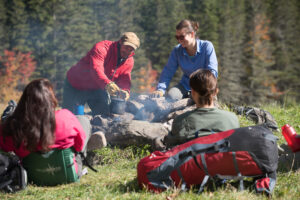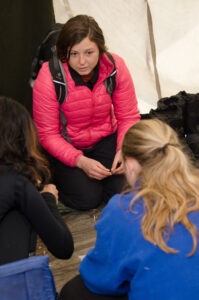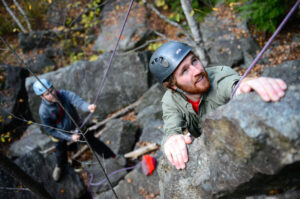 The physical and medical safety of our students is of the utmost importance to the whole team at True North. The Wilderness First Responder (WFR) certification is the “Gold Standard” in medical training for anyone working in an outdoor environment. It is the definitive medical course for wilderness travelers. The 80 hour course is usually spread over 8-10 days with many opportunities for students to ask questions and debrief real scenarios. The curriculum begins at patient assessment which is the most important part of the entire course. Participants gain knowledge and confidence on how to identify problems and assess a patient’s medical status. The bulk of the course addresses many common injuries and illnesses and ends with the more obscure and environmentally unique.
The physical and medical safety of our students is of the utmost importance to the whole team at True North. The Wilderness First Responder (WFR) certification is the “Gold Standard” in medical training for anyone working in an outdoor environment. It is the definitive medical course for wilderness travelers. The 80 hour course is usually spread over 8-10 days with many opportunities for students to ask questions and debrief real scenarios. The curriculum begins at patient assessment which is the most important part of the entire course. Participants gain knowledge and confidence on how to identify problems and assess a patient’s medical status. The bulk of the course addresses many common injuries and illnesses and ends with the more obscure and environmentally unique.
 At True North, Guides are required to complete and pass a WFR course prior to becoming a Lead Guide. All guides start with a minimum certification in First-Aid and CPR. The WFR certification is above and beyond what is required but we strongly believe that it is an asset for all of our guides to possess. Not only does the WFR course provide training for medical injuries, it teaches participants how to avoid and minimize risk. Risk assessment is a crucial skill that every guide must possess. Being able to identify, and potentially minimize risk, is at the forefront of how our guides provide physical and emotional safety within a group. It is the comprehension and mastery of the medical training that breeds confidence within a True North guide.
At True North, Guides are required to complete and pass a WFR course prior to becoming a Lead Guide. All guides start with a minimum certification in First-Aid and CPR. The WFR certification is above and beyond what is required but we strongly believe that it is an asset for all of our guides to possess. Not only does the WFR course provide training for medical injuries, it teaches participants how to avoid and minimize risk. Risk assessment is a crucial skill that every guide must possess. Being able to identify, and potentially minimize risk, is at the forefront of how our guides provide physical and emotional safety within a group. It is the comprehension and mastery of the medical training that breeds confidence within a True North guide.
 Guides also have constant access with our base through radio and other means of communication, so they can report any medical concerns and can have immediate responsiveness in the case of emergencies. True North has the unique benefit of having many different field areas that feel deep in the woods, but most are extremely accessible with the University Of Vermont Medical Center within 20 miles of most areas. Access to a variety of different urgent care facilities and hospitals allows parents and students to feel as safe as possible, knowing that they can receive quality medical care quickly in case of an emergency.
Guides also have constant access with our base through radio and other means of communication, so they can report any medical concerns and can have immediate responsiveness in the case of emergencies. True North has the unique benefit of having many different field areas that feel deep in the woods, but most are extremely accessible with the University Of Vermont Medical Center within 20 miles of most areas. Access to a variety of different urgent care facilities and hospitals allows parents and students to feel as safe as possible, knowing that they can receive quality medical care quickly in case of an emergency.


